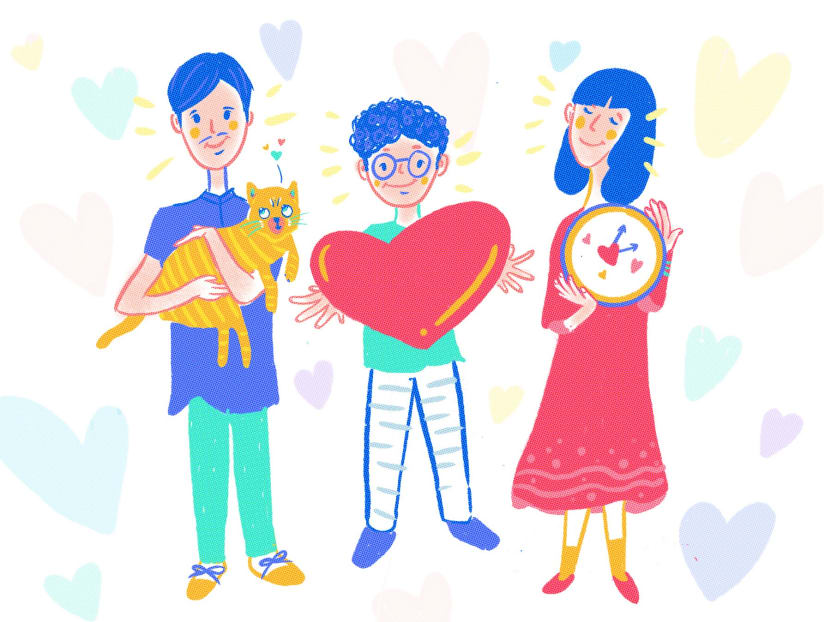Help others and help yourself — by donating your time and volunteering
Volunteering is about giving back to the community, and it is important. Beyond giving back, though, helping others also provides the giver with benefits ranging from leadership experience to better health.
Volunteering is about giving back to the community, and it is important.
Beyond giving back, though, helping others also provides the giver with benefits ranging from leadership experience to better health.
With the approach of the festive season and the good feelings it generates, more people often think about volunteering their time to help the community. Too seldom, however, do those thoughts translate into action.
While 70 per cent of people here say that they intend to volunteer, the Individual Giving Survey 2018 by the National Volunteer and Philanthropy Centre found that that only 29 per cent do so.
The rate for millennials aged 25 to 34 is even lower, at 27 per cent.
Many people may feel that the time spent on their day job and family make it difficult to fit in volunteering activities.
Another reason for that low level of volunteerism may also be the amount of time spent on digital media.
Indeed, the Digital in 2019 survey by creative agency We Are Social found that respondents in Singapore spend seven hours every day on the internet, two hours on social media and two hours watching television or videos.
YouTube and WhatsApp are the most popular, and people also downloaded more than 245 million mobile applications last year.
While digital media clearly has its place, replacing just a little of the time spent on digital media or other activities with volunteering can bring benefits that many people may not expect.
BENEFITS FOR RECEIVERS AND GIVERS
Whether your cause is helping seniors, teaching youth, taking care of animals or something else, your contributions as a volunteer clearly benefit the community. As one volunteer said recently, for example, the seniors he spends time with just once a week see him as their lifeline because they have a limited social life and few visitors. It definitely makes a difference to others when you give of yourself in this way.
Yet donating time also benefits the volunteer as well.
It can help your career, for example. Consulting giant Deloitte found through research in the United States, for instance, that experience as a volunteer can play a big role in building leadership skills considered as “must-haves” for successful leaders.
Moreover, a resume that shows experience as a volunteer may make job candidates more attractive to employers.
The recent trend at some companies of skills-based volunteering has even become “the new executive training ground”, as described by American community development organisation CDC Development Solutions' managers Amanda MacArthur and Alicia Ness.
Young people who volunteer, they said, gain cultural skills and insights that will influence them for decades to come.
Along with improving careers and happiness, being a volunteer can improve your health.
Researchers at the London School of Economics found, for instance, that the more people volunteer, the happier they are. Wharton professor Cassie Mogilner found that people who volunteer their time feel like they have more free time.
Research by the Mayo Clinic, a medical research organisation, found that volunteering reduces stress, decreases the risk of depression, gives a sense of purpose, and may buffer stress.
The Harvard University Medical School found that people who give their time to others may have better physical health. And the National Council for Voluntary Organisations in the United Kingdom said that there is strong evidence of a link between volunteering, improved mental health, wellbeing and improved social connections.
DECISIONS TO MAKE BEFORE YOU VOLUNTEER
If you do decide to volunteer, it is easy to find places with a simple Google search. Experts suggest, though, that several steps beyond just a simple search can make donating your time more effective and meaningful.
First, decide on your purpose and why you want to volunteer. You should consider your personal values, interests, skills and talents so that you can find the right match.
And since you are likely to be around beneficiaries and other volunteers, consider the types of people you want to spend time with as well.
Then, figure out the level at which you will have the greatest impact. As leadership consultant AC Ho describes it, there are four levels of volunteering.
The first is when you simply show up to help out, such as cooking food or taking people to appointments.
The second is when you have professional expertise to contribute.
In the third, you contribute through coaching, mentoring or managing events.
And the fourth is when you contribute strategically, such as serving on a board or planning an organisation’s future.
“We need to ask ourselves, ‘What is my best level of contribution?’” Mr Ho said.
Finally, find and choose an organisation. A good source of information is the National Volunteer & Philanthropy Centre’s giving.sg platform, which lists causes in 14 categories and has links to organisations in sectors ranging from animal welfare or arts to sports or women and girls.
The National Arts Council offers opportunities for people to volunteer in the arts, and media publisher TheSmartLocal describes volunteering opportunities in many categories.
Once you have found non-profits that might be possibilities, take a quick look to make sure that their goals align with your values, they use money wisely, and they have a positive impact.
Doing that little bit of research can make a big difference in selecting the right cause. Then, contact them and start volunteering.
Whether you volunteer sporadically or regularly, you’ll likely find that you have a tremendous positive impact on the beneficiaries and the community. And along with helping others, you’ll also be helping yourself.










